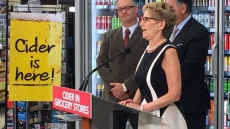OTTAWA — Canadian truckers fear a planned new border security measure will steer them into a complicated maze of U.S. law that dents their pocketbooks — or even creates immigration difficulties.
The Liberal government recently introduced legislation that would step up the exchange of information with Washington about people crossing the Canada-U.S. border.
The system involves swapping entry information collected from travellers at the land border, so that data on entry to one country serves as a record of exit from the other.
The Canadian Trucking Alliance wants assurances U.S. authorities won't use the data to unduly argue that Canadian drivers are spending enough time south of the border to be considered American residents for tax purposes.
"This could cause some truckers to exit the market, creating potential capacity shortages in the transborder trucking space," alliance president David Bradley warned Public Safety Minister Ralph Goodale in a letter.
"There already is a chronic shortage of truck drivers in Canada."

Under the U.S. Internal Revenue Service's "substantial presence test," a person can be subject to U.S. tax on their worldwide income if they spend more than 120 days annually in the United States, Bradley noted in the November letter, released under the Access to Information Act.
Someone who spends more than 180 days in the United States in any 12-month period could face sanctions for being unlawfully present, he added.
The alliance, which represents some 150,000 workers, says a big part of the problem is that any portion of a 24-hour period spent on U.S. soil might be chalked up as a day.
"If we count a few minutes to drop off a load and go back as a day in the United States, that could lead to some issues," Bradley said in an interview. "So it's a matter of interpretation. And I think that we would like clarification."
The new system could mean "much more administration" in terms of route planning for Canadian drivers wary of surpassing the time thresholds, Bradley said.

"These things are all subject to appeal and to review and interpretation. But once you get into those processes, even if you're right, it's costly and time-consuming and really not productive."
Canadians travelling to the United States have always been responsible for complying with local obligations, said Scott Bardsley, a spokesman for Goodale.
"The federal government continues to work with stakeholders to grow our economy and help Canadians do business, and is open to discussing issues of concern to them."
Bradley hinted he has received some positive signals on the issue from Canadian officials.

"I think that, as a general rule, the government of Canada understands certainly much better than the U.S. federal government the economic imperative of trade facilitation versus security. But this is the world we live in, and we're going to have to see how things play out."





